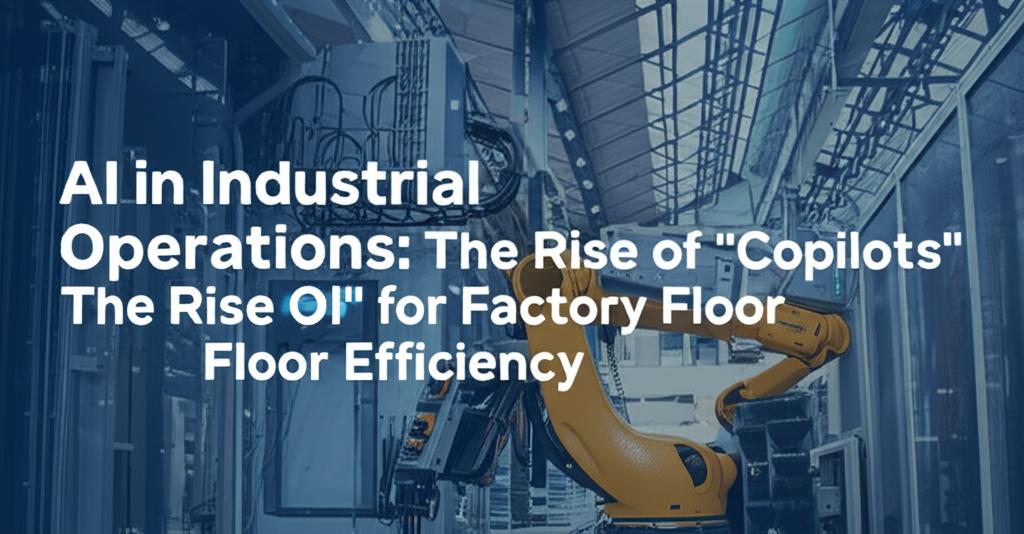The manufacturing sector is undergoing a significant transformation with the integration of cutting-edge technologies, and Artificial Intelligence (AI) is at the forefront. Among the advancements in AI, "copilots" – AI-based assistants – are emerging as powerful tools to enhance factory floor operations. These systems collaborate with human workers, utilizing machine learning and advanced computer vision to provide real-time guidance, validation, and process optimization.
The Need for AI Copilots in ManufacturingTraditional manufacturing methods often struggle with challenges such as human error, inconsistent quality control, and lengthy training processes. Studies show that human error can account for a significant portion of unplanned downtime. AI copilots address these critical issues by offering:
- Enhanced Efficiency and Productivity: AI copilots can analyze vast amounts of data from sensors, machines, and production lines to identify bottlenecks and inefficiencies. By providing actionable insights, they help manufacturers streamline processes, reduce waste, and increase overall productivity. Research suggests that AI copilots can improve productivity in manufacturing operations by as much as 55%.
- Improved Quality Control: By providing real-time feedback and validation, AI copilots help reduce errors and ensure consistent product quality. They assist operators in accurately performing quality tests and inspections.
- Predictive Maintenance: AI copilots excel at predictive maintenance by continuously monitoring equipment health and performance. They can forecast potential failures, allowing for proactive maintenance and reducing costly unplanned downtime. This also extends the lifespan of machinery.
- Optimized Training: AI copilots can serve as virtual instructors, providing step-by-step guidance and personalized training that adapts to individual learning paces. This reduces training time and the need for repetitive instruction.
- Better Decision-Making: AI copilots generate large amounts of data through constant process monitoring. Analyzing this data provides actionable insights, leading to more informed, data-driven decision-making.
- Supply Chain Optimization: AI copilots can analyze data from suppliers, inventory levels, and market demand to optimize supply chain management. They can predict disruptions, recommend optimal inventory levels, and suggest alternative suppliers, ensuring a more resilient and efficient supply chain.
- Sustainability and Energy Efficiency: AI copilots contribute to sustainability goals by optimizing energy consumption, reducing waste, and minimizing the environmental impact of manufacturing processes.
AI copilots leverage technologies like Natural Language Processing (NLP), machine learning (ML), and task automation. They process and analyze vast amounts of data in real-time to provide contextual support. Key mechanisms include:
- Understanding Context: Using NLP to comprehend user queries and retrieve relevant data.
- Data Integration and Processing: Accessing structured and unstructured data from existing software systems (e.g., CRM, ERP) to deliver actionable insights.
- Real-Time Suggestions: Providing immediate, contextually relevant recommendations.
- Automation of Repetitive Tasks: Handling routine operations like drafting reports or organizing schedules, freeing up human workers for more strategic tasks.
AI copilots are proving effective across diverse industries. For instance, in the automotive sector, AI-based video analytics can label manual tasks to eliminate human errors and optimize line balancing. Companies like Siemens and Microsoft are collaborating to bring AI copilots to industrial environments, with numerous customers already using these tools to improve efficiency, reduce downtime, and address labor shortages. Thyssenkrupp Automation Engineering, for example, plans a global rollout of an AI copilot starting in 2025. ABB has also launched its Genix Copilot with Microsoft to help industries improve efficiency and sustainability by contextualizing data and providing actionable insights.
These AI-powered assistants can empower engineering teams to generate code for programmable logic controllers using natural language, significantly speeding up code generation while minimizing errors. They can also summarize lengthy documentation, automate training workflows, and provide natural language recommendations for preventive maintenance.
The Future of AI Copilots in ManufacturingThe market for AI in manufacturing is projected to grow significantly, with AI copilots playing a key role in this expansion. As AI technology continues to evolve, the capabilities of these copilots will expand, offering even more sophisticated solutions. Future developments may include:
- Proactive Decision-Making: Moving beyond reactive support to anticipate user needs and suggest preventative measures.
- Industry-Specific Copilots: Tailored AI copilots for various manufacturing sub-sectors, offering deeper, more relevant insights.
- Multimodal Capabilities: Integrating the ability to understand and generate responses from diverse inputs like text, voice, and images.
- Agentic AI: The emergence of specialized AI agents, or copilots, for high-value tasks within operations, supply chain, and industry-specific Product Lifecycle Management (PLM).
While AI copilots are not intended to replace human workers, they are set to augment human capabilities, leading to increased productivity, enhanced efficiency, and a more resilient manufacturing industry. Manufacturers leveraging AI copilots are investing in a future of smart manufacturing, operational excellence, and sustained growth.

